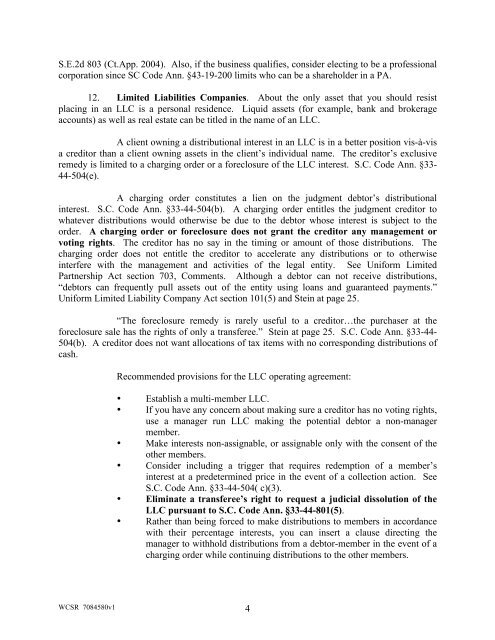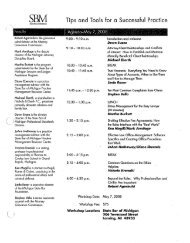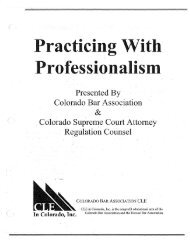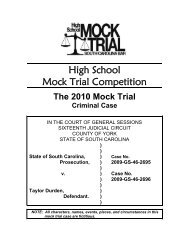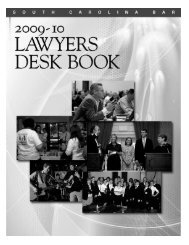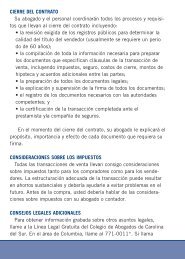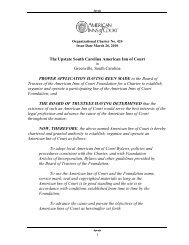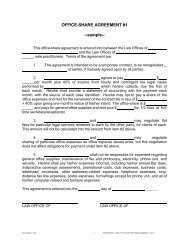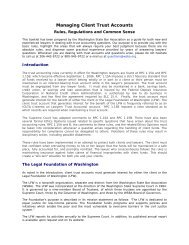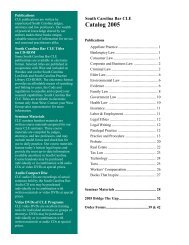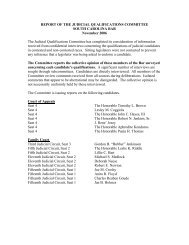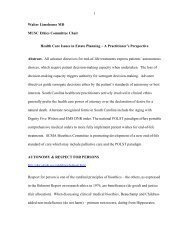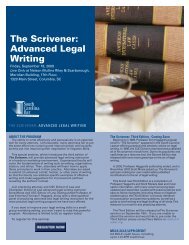Probate, Estate Planning & Trust Section - South Carolina Bar ...
Probate, Estate Planning & Trust Section - South Carolina Bar ...
Probate, Estate Planning & Trust Section - South Carolina Bar ...
You also want an ePaper? Increase the reach of your titles
YUMPU automatically turns print PDFs into web optimized ePapers that Google loves.
S.E.2d 803 (Ct.App. 2004). Also, if the business qualifies, consider electing to be a professional<br />
corporation since SC Code Ann. §43-19-200 limits who can be a shareholder in a PA.<br />
12. Limited Liabilities Companies. About the only asset that you should resist<br />
placing in an LLC is a personal residence. Liquid assets (for example, bank and brokerage<br />
accounts) as well as real estate can be titled in the name of an LLC.<br />
A client owning a distributional interest in an LLC is in a better position vis-à-vis<br />
a creditor than a client owning assets in the client’s individual name. The creditor’s exclusive<br />
remedy is limited to a charging order or a foreclosure of the LLC interest. S.C. Code Ann. §33-<br />
44-504(e).<br />
A charging order constitutes a lien on the judgment debtor’s distributional<br />
interest. S.C. Code Ann. §33-44-504(b). A charging order entitles the judgment creditor to<br />
whatever distributions would otherwise be due to the debtor whose interest is subject to the<br />
order. A charging order or foreclosure does not grant the creditor any management or<br />
voting rights. The creditor has no say in the timing or amount of those distributions. The<br />
charging order does not entitle the creditor to accelerate any distributions or to otherwise<br />
interfere with the management and activities of the legal entity. See Uniform Limited<br />
Partnership Act section 703, Comments. Although a debtor can not receive distributions,<br />
“debtors can frequently pull assets out of the entity using loans and guaranteed payments.”<br />
Uniform Limited Liability Company Act section 101(5) and Stein at page 25.<br />
“The foreclosure remedy is rarely useful to a creditor…the purchaser at the<br />
foreclosure sale has the rights of only a transferee.” Stein at page 25. S.C. Code Ann. §33-44-<br />
504(b). A creditor does not want allocations of tax items with no corresponding distributions of<br />
cash.<br />
Recommended provisions for the LLC operating agreement:<br />
• Establish a multi-member LLC.<br />
• If you have any concern about making sure a creditor has no voting rights,<br />
use a manager run LLC making the potential debtor a non-manager<br />
member.<br />
• Make interests non-assignable, or assignable only with the consent of the<br />
other members.<br />
• Consider including a trigger that requires redemption of a member’s<br />
interest at a predetermined price in the event of a collection action. See<br />
S.C. Code Ann. §33-44-504( c)(3).<br />
• Eliminate a transferee’s right to request a judicial dissolution of the<br />
LLC pursuant to S.C. Code Ann. §33-44-801(5).<br />
• Rather than being forced to make distributions to members in accordance<br />
with their percentage interests, you can insert a clause directing the<br />
manager to withhold distributions from a debtor-member in the event of a<br />
charging order while continuing distributions to the other members.<br />
WCSR 7084580v1 4


